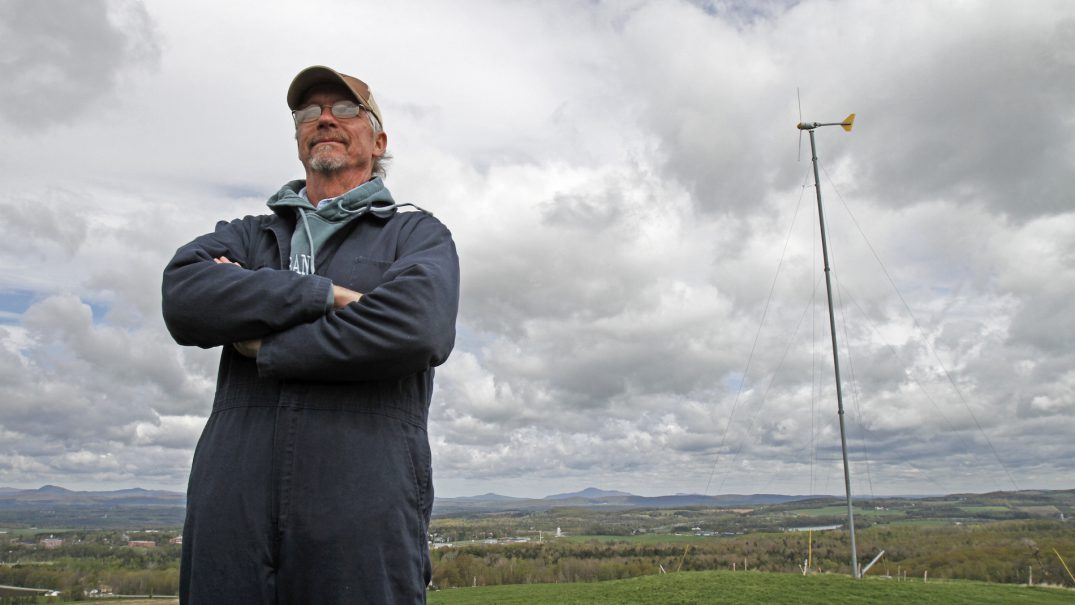Put public services into the hands of local governments

Bryan Davis stands on the hilltop with his wind turbine on Friday, May 11, 2012 in Derby Line, Vt. A Vermont wind power developer and two dairy farmers in the border community of Derby Line say they’ve been surprised at the level of opposition to a plan to build two turbines that has been coming from the Quebec town of Stanstead.(AP Photo/Toby Talbot)
The push for public ownership of vital services should not be about a return to top-down state industries. We can’t go back to the past – and we want the public ownership of the future to be better than ever before. But also because the public ownership of the future must explicitly involve a new dimension: local public ownership. Of course, national level services like the NHS and the railways are absolutely key. But local public ownership – of energy, water, buses and council services – is just as important.
Public ownership should mean more accountable, efficient services, whether that’s at the local, regional, national or international level. Locally, this involves councils running or taking over strategic public assets or contracts for services, and it has huge potential.
Extreme government pressure on budgets has led to council cuts and privatisation – what Polly Toynbee calls ‘the retreat of the human face of the state’. At the same time, there’s an exciting countertrend towards more local public ownership, not just in conversations happening within Labour, but also globally and in the UK.
170 German municipalities have bought back their energy grid since 2007. 235 cities worldwide, including cities like Atlanta and Houston in the US and Paris in Europe, have taken water services into public ownership since 2000. APSE research has shown that dozens of UK councils have brought services like recycling in-house to save money and improve quality. 12 municipal companies provide excellent bus services in places like Reading and Edinburgh. We now have Robin Hood Energy in Nottingham, the first council-owned energy company.
It’s no surprise that there’s been a global surge of interest in public ownership at the local level. Prices for basic needs like power and water keep rising, and private providers are often inadequate. But local public ownership is also exciting because of its potential impact on the wider economy and society. Here are five reasons to embrace it.
- Many people feel a lack of control over their lives in the UK today. At least one reason for the Brexit vote in June is that a large group of people had a sense of political powerlessness channelled into anti-EU feeling. Local ownership brings people closer to services, restoring people power and accountability.
- Local ownership provides an employment boost. While nationwide unemployment dipped below 5% in mid-2016, unemployment remains high in some cities and regions. Local ownership could be a part of a jobs strategy for these centres.
- Strong local public services boost local economies through the multiplier effect. Councils who spend money on in-house services or local procurement will boost the money in the pockets of local employees and providers who re-spend a high proportion within the same area.
- Local ownership produces an important stream of revenue. Some compensation or payment is required at first to secure local ownership. But after an initial investment, local ownership builds the asset base of local government, which can be used to pay for public services or reduce debt
- Local ownership improves social cohesion and local pride, mobilising people to take action in their own lives or to be more involved with politics. Scottish community energy projects have boosted awareness of the benefits of renewables. It’s also a bridge to other forms of community ownership. Danish windfarms have succeeded through a combination of local ownership, national ownership, and cooperatives.
Privatisation often costs us more – in shareholder profits, fragmentation and higher interest – while evidence shows that it’s not more efficient. Local ownership gives us a clear alternative that would also boost local economies and communities across the UK. Let’s take it local.






